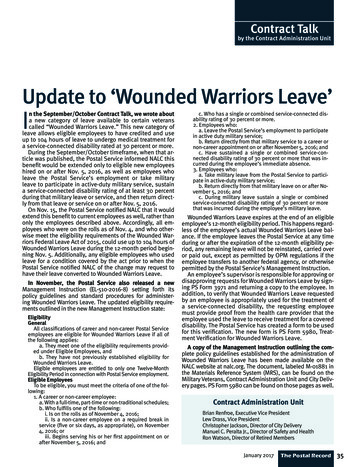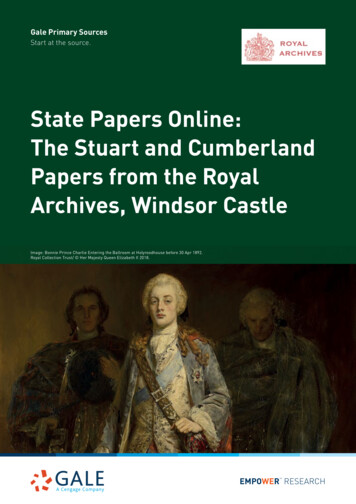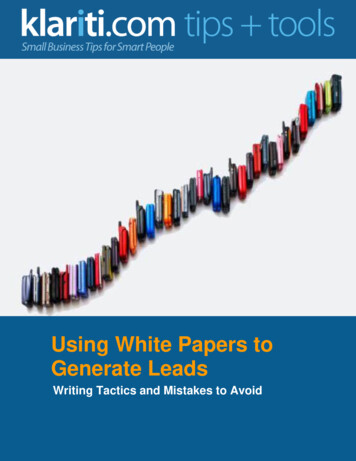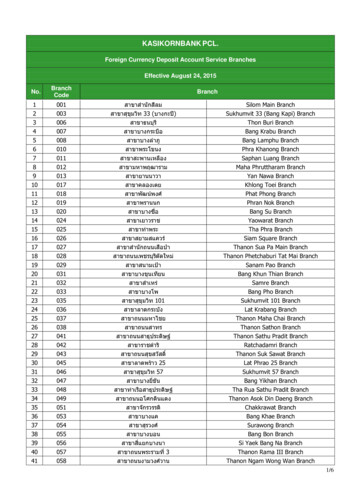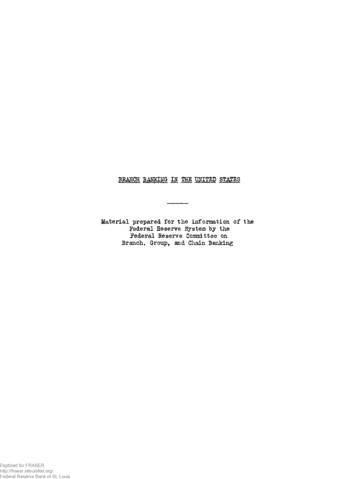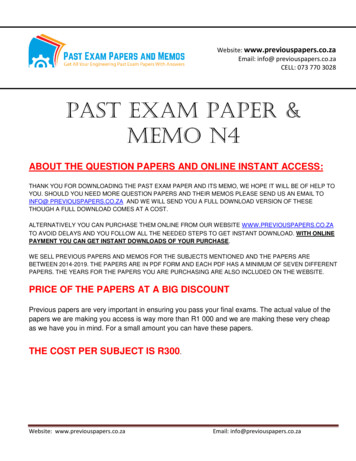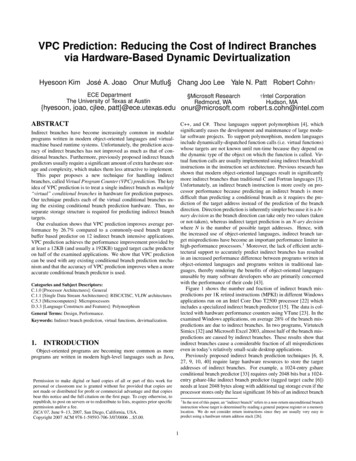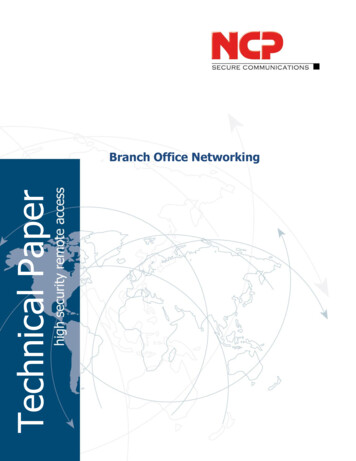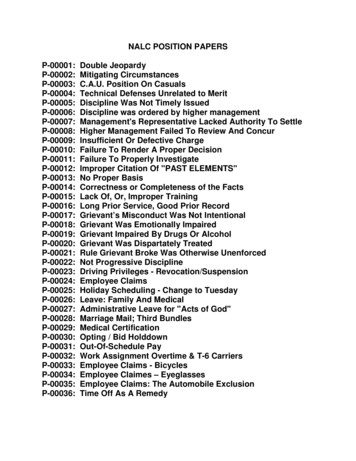
Transcription
NALC POSITION 031:P-00032:P-00033:P-00034:P-00035:P-00036:Double JeopardyMitigating CircumstancesC.A.U. Position On CasualsTechnical Defenses Unrelated to MeritDiscipline Was Not Timely IssuedDiscipline was ordered by higher managementManagement's Representative Lacked Authority To SettleHigher Management Failed To Review And ConcurInsufficient Or Defective ChargeFailure To Render A Proper DecisionFailure To Properly InvestigateImproper Citation Of "PAST ELEMENTS"No Proper BasisCorrectness or Completeness of the FactsLack Of, Or, Improper TrainingLong Prior Service, Good Prior RecordGrievant’s Misconduct Was Not IntentionalGrievant Was Emotionally ImpairedGrievant Impaired By Drugs Or AlcoholGrievant Was Dispartately TreatedRule Grievant Broke Was Otherwise UnenforcedNot Progressive DisciplineDriving Privileges - Revocation/SuspensionEmployee ClaimsHoliday Scheduling - Change to TuesdayLeave: Family And MedicalAdministrative Leave for "Acts of God"Marriage Mail; Third BundlesMedical CertificationOpting / Bid HolddownOut-Of-Schedule PayWork Assignment Overtime & T-6 CarriersEmployee Claims - BicyclesEmployee Claimes – EyeglassesEmployee Claims: The Automobile ExclusionTime Off As A Remedy
NALC POSITION 031:P-00032:P-00033:P-00034:P-00035:P-00036:Double JeopardyMitigating CircumstancesC.A.U. Position On CasualsTechnical Defenses Unrelated to MeritDiscipline Was Not Timely IssuedDiscipline was ordered by higher managementManagement's Representative Lacked Authority To SettleHigher Management Failed To Review And ConcurInsufficient Or Defective ChargeFailure To Render A Proper DecisionFailure To Properly InvestigateImproper Citation Of "PAST ELEMENTS"No Proper BasisCorrectness or Completeness of the FactsLack Of, Or, Improper TrainingLong Prior Service, Good Prior RecordGrievant’s Misconduct Was Not IntentionalGrievant Was Emotionally ImpairedGrievant Impaired By Drugs Or AlcoholGrievant Was Dispartately TreatedRule Grievant Broke Was Otherwise UnenforcedNot Progressive DisciplineDriving Privileges - Revocation/SuspensionEmployee ClaimsHoliday Scheduling - Change to TuesdayLeave: Family And MedicalAdministrative Leave for "Acts of God"Marriage Mail; Third BundlesMedical CertificationOpting / Bid HolddownOut-Of-Schedule PayWork Assignment Overtime & T-6 CarriersEmployee Claims - BicyclesEmployee Claimes – EyeglassesEmployee Claims: The Automobile ExclusionTime Off As A Remedy
NALC POSITIONDOUBLE JEOPARDY (P-00001)Double JeopardyManagement may not twice impose discipline for a single act of misconduct. Thus, to issueboth a letter of warning and seven-day suspension for the same roll-away accident would beimproper. It is not improperly subjecting a letter carrier to double jeopardy, however, when aremoval is issued for the same misconduct for which an emergency suspension or anindefinite suspension has been issued (unless the employee was returned to work after thesuspension).
NALC POSITIONMitigating Circumstances (P-00002)Allegations that, Because of Mitigating Circumstances, the Discipline Imposed is too Harsh,or No Discipline is Warranted. The final group of defenses may be called the "mitigation"defenses. With them, the NALC in effect says "even assuming that the grievant's behaviorconstitutes misconduct, when all relevant factors are considered the amount of disciplineimposed is excessive." "Mitigation" should not be confused with "leniency". The mitigationdefenses present a variety of factors which management should have considered whenimposing discipline, and which an arbitrator will consider even if management didn't.Leniency--simply asking for another change--is within the exclusive province of management,and will not be considered by any arbitrator. Grievant may have acted improperly, but did soas a result of lack of, or improper, training (including claims that the grievant "didn't know itwas wrong"). A letter carrier should not be disciplined for violating a rule of which he or shewas not aware. It should be noted, however, that employees are presumed to know themajor rules of the shop. This defense, therefore, will not be useful where the grievant hasassaulted a customer, or has intentionally discarded deliverable mail.
NALC POSITIONCAU POSITION ON CASUALS (P-00003)Over the course of the past 15 years, NALC and APWU have taken at least six grievances concerningone aspect or another of casual employment to national level arbitration (see, e.g, C-00114, C-00403,C-00449, C-00675, C-00895, C-03246). All were denied.Grievances appealed to Step 4 may be divided into two basic categories: first, claims that PTFScarriers must be worked across craft lines to perform straight time work before such work is given tocasuals and, second, claims that PTFS carriers have an absolute right to perform carrier work at thestraight time rate before any such work is given to casuals.The Contract Administration Unit is in complete agreement with the position taken in the first categoryof cases, and there is, in addition, substantial external support for that position. Arbitrator ElliotGoldstein, in a regional level case (C-01215) sustained NALC's grievance where casuals were workedin the clerk craft while PTFS carriers were idle. Further, a 1976 Senior Assistant Postmaster Generalmemorandum (M-00312) and the prearbitration decision M-00964 support our position on this issue.The second category--claims that PTFS carriers must be given absolute priority in scheduling--ismurkier. The same Senior Assistant Postmaster General memorandum that supports our position inthe first category of cases contradicts our position on this issue. It states that priority need not begiven to PTFS employees "where it is projected that the part-time flexible will otherwise be scheduledfor 40 hours during the service week." That interpretation was not challenged by NALC when it wasissued. A second strike against our position is found in the national level decision of ArbitratorHoward Gamser (C-00403). In that case, management worked PTFS clerks at the beginning of theservice week, used casuals in the middle of the week, and returned to the PTFS clerks at the end ofthe week. APWU grieved, asserting that the PTFS clerks were entitled to work a full 40 hour weekbefore any work was assigned to casuals. Denying APWU's grievance, Gamser ruled:Nor does the language of Article 7, Section 1-B-2, which provides, in part "during the course of theservice week, the Employer will make every effort to insure that qualified and available part-timeflexible employees are utilized at the straight time rate prior to assigning such work to casuals"prevent the Service from making rational decisions regarding the scheduling of the casual work forceto handle certain work for which its limited qualifications make its use more appropriate. It does notprevent consideration of the work load and composition of that work load during the entire serviceweek rather than on a day by day basis.Given this background, we have reluctantly concluded that a national level arbitrator would ruleagainst us if we were to proceed to arbitration with the abstract issue whether in all circumstances aPTFS must be given absolute priority in scheduling on a daily basis. However, the line between whatmanagement may do and what management may not do in this area has not been so clearly drawnthat NALC should permit management complete freedom to do as it wishes. If, for example, PTFScarriers were consistently worked on a six-day per week basis while casuals were making 40 hours injust five days, and if the work being performed by the PTFS carriers and by the casuals weresubstantially identical, and if this situation persisted over a considerable period, there might be ameritorious grievance.
NALC POSITIONTechnical Defenses Unrelated to Merit (P-00004)Technical Defenses Unrelated to the Merits of the Discipline.Many arbitrators have found principles of procedural due process to be implied by the justcause standard. The examples of technical defenses in this section illustrate ways in whicharbitrators have applied these principles in USPS cases. When technical defenses are used,NALC turns the tables and takes the initiative. Management, who started the whole businessby making an accusation of misconduct, finds the finger pointed back at it. Because technicaldefenses are exhilarating, there is an unfortunate temptation to try to use them in every case,even where not quite justified. This temptation should be resisted, because overuse bluntstheir sharp effect, and erodes credibility. And in any event, other legitimate defenses may befound in almost every case.
NALC POSITIONDISCIPLINE WAS NOT TIMELY ISSUED. (P-00005)DISCIPLINE WAS NOT TIMELY ISSUED.When management discovers a letter carrier's misconduct, it must initiate discipline in atimely manner. If management does not do so, it waivers whatever rights it may have toimpose discipline. It is not clear exactly where the line is drawn between timely and untimelydiscipline. A letter of warning for a one-minute extension of a break issued thirty years afterthe event would obviously be untimely. However, a removal two weeks after mail wasdiscarded might be found timely, particularly where management spent the two-week periodinvestigating to make certain that it had all the facts before it acted to impose discipline.
NALC POSITIONDiscipline was ordered by higher management (P-00006)Discipline was ordered by higher management, rather than by the grievant's immediatesupervisor.The decision whether to impose discipline, and the decision as to the degree of discipline tobe imposed, should be made by the letter carrier's immediate supervisor. While higherauthority may advise, if asked, it is improper for officials above the immediate supervisor toinitiate discipline or to override the immediate supervisor's recommendation as to extent ofpenalty.
NALC POSITIONMANAGEMENT'S REPRESENTATIVE LACKED AUTHORITY TO SETTLE(P-00007)Management's grievance representative lacked authority to settle the grievance.Article 15 specifically confers upon management's grievance representatives full authority toresolve any grievance. Where it can be demonstrated that management's representativelacked authority, discipline has sometimes been overturned. (This defense is closely relatedto the technical defense above. Where higher management has initiated discipline, it ispresumed that subordinate supervisors lack authority to settle.)
NALC POSITIONHIGHER MANAGEMENT FAILED TO REVIEW AND CONCUR (P-00008)HIGHER MANAGEMENT FAILED TO REVIEW AND CONCUR. Article 16: Section 8While it is up to the immediate supervisor to initiate disciplinary action, before a suspensionor removal is imposed it must be reviewed and concurred in by higher-level management.
NALC POSITIONINSUFFICIENT OR DEFECTIVE CHARGE (P-00009)INSUFFICIENT OR DEFECTIVE CHARGEArticle 16 requires that management give a letter carrier a written notice of charges whenimposing a suspension or a discharge. Implicit in this requirement is that the notice ofcharges describe and explain the basis for the discipline with sufficient specificity that theletter carrier may make a defense.
NALC POSITIONFAILURE TO RENDER A PROPER DECISION (P-00010)MANAGEMENT FAILED TO RENDER A PROPER GRIEVANCE DECISION.Article 15 requires that management state certain information in its Step 2 and Step 3grievance decisions. Failure by management to state that information has sometimesresulted in the overturning of the contested discipline.
NALC POSITIONFAILURE TO PROPERLY INVESTIGATE (P-00011)MANAGEMENT FAILED TO PROPERLY INVESTIGATE BEFORE IMPOSING DISCIPLINEBefore the decision to impose discipline is made, management must conduct a full, fair andimpartial investigation, including giving the letter carrier an opportunity to respond to thecharges.
NALC POSITIONIMPROPER CITATION OF "PAST ELEMENTS" (P-00012)IMPROPER CITATION OF "PAST ELEMENTS" (Article 16: Section 2)It is improper for management to cite discussions as past elements in support of anotherdisciplinary charge. It is also improper to cite discipline which has been grieved but not finallysettled or adjudicated as a past element. When these are cited, arbitrators sometimes orderthe present discipline rescinded or modified.
NALC POSITIONNO PROPER BASIS (P-00013)DISPUTES WHETHER GRIEVANT'S CONDUCT, IF PROVEN, WOULD CONSTITUTE Aproper basis for the imposition of discipline.All letter carrier behavior may conceptually be divided into two categories: 1) behavior forwhich no discipline may be imposed, and 2) misconduct for which discipline may be imposed.Examples of behavior for which discipline may not be imposed include finishing one's routeon time every day, or taking lunch at an authorized location. Examples of misconduct forwhich discipline may ordinarily be imposed include stealing from the mail, or assaulting asupervisor.Sometimes management crosses the line between these categories, and issues discipline forbehavior which may not properly characterized as misconduct, either because the behaviorviolates no rule, or because the rule which is violated is invalid. When this happens, thediscipline should be disallowed.While this is a dramatic defense, it is inapplicable to most disciplinary actions--decisionsdirectly addressing this defense account for fewer than .01% of NALC's discipline arbitrations.Although the opportunities to employ this defense are infrequent, it is the only proper defensein certain recurring situations. For example, management sometimes disciplines employeessimply for failure to meet the "18 and 8" standard. Such a charge does not form a valid basisfor the imposition of discipline, because NALC and USPS have jointly agreed that failure tomeet that standard, by itself, is not disciplinable misconduct. In such situations, the NALCrepresentative handling the grievance must look behind the charge and ask "what is the ruleimplied by the charge?"Where the charge is failure to meet standard, the rule implied is that failure to meet standard,by itself, is disciplinable misconduct. But such failure is not misconduct, and this defense,therefore, should be employed. In other kinds of cases, a valid rule will be found to beimplied. For example, in a discharge for fighting the rule implied by the charge is that fightingis disciplinable misconduct, a valid rule. And because a valid rule was found, this defensecould not appropriately be used.
NALC POSITIONCorrectness or Completeness of the Facts (P-00014)Disputes about the Correctness or Completeness of the Facts used to Justify the Discipline.1. FAILURE TO PROVE GRIEVANT ACTED AS CHARGED2. GRIEVANT MAY HAVE ACTED AS CHARGED, BUT WAS PROVOKED BY ANOTHER.This defense may be divided into two major categories.The first category--management failed to prove that grievant acted as charged--is a defensethat is available in every discipline case. This is so because whenever management issuesdiscipline, it assumes the burden of proving that the grievant acted in such a way as toprovide cause for discipline. To meet this burden, management must come forward withprobative evidence sufficient to convince the arbitrator that the misconduct with which thegrievant has been charged actually occurred. The union does not bear a correspondingburden--it does not have to prove that the grievant did not act as charged. Instead, theunion's job is to poke holes in the proofs offered by management.This is not to say that the union should waive its opportunity to present its side of the case. Ifthe union can prove through its own presentation of evidence that the grievant did not act ascharged, so much the better.The second category--grievant may have acted as charged, but was provoked by another--isan affirmative defense. If the union employs this defense, it bears the burden of proving thatprovocation occurred. Thus, for example, if a letter carrier punches a supervisor, the unionmust prove that the supervisor first attacked the letter carrier, and that the letter carrier wasmerely defending him or herself.FAILURE TO PROVE GRIEVANT ACTED AS CHARGED.Before any discipline will be allowed, management must prove that the letter carrier actuallyengaged in the misconduct with which charged. Management's proof must be in the form ofevidence. Arguments, assumptions, guesses, conjectures, allegations or speculations are notevidence. Testimony of a witness who has personal and direct knowledge is evidence, asmay be photographs or fingerprints.The arbitrator's primary function in a typical discipline case is to weigh the evidence, todetermine whether the evidence is sufficient to conclude that management has met itsburden of proof. In performing this function, the arbitrator must decide the weight, if any, tobe given hearsay or circumstantial evidence; and if witnesses have given testimony which iscontradictory, the arbitrator must decide whose testimony is to be credited, and whosediscounted. The decisions listed under 'Supporting Cases,' below, illustrate the ways in whicharbitrators deal with these kinds of problems.When you are preparing to make this defense in a case, you should also look at otherdiscipline cases having the same charge. By doing so, you'll be able to identify the kind ofevidentiary problems that may be specific to a certain charge. For example, the fact patterns
found in falsification of employment application cases are quite similar to each other, but arequite different from the fact patterns found in cases in which discarding deliverable mail ischarged--and the methods used by arbitrators to resolve disputes of fact in the two kinds ofcases is also quite different.GRIEVANT MAY HAVE ACTED AS CHARGED, BUT WAS PROVOKED BY ANOTHER.This is one of the only possible defenses to some forms of misconduct, including assaults onsupervisors, customers, or other employees.
NALC POSITIONLACK OF, OR IMPROPER, TRAINING (P-00015)Allegations that, Because of Mitigating Circumstances, the Discipline Imposed is too Harsh,or No Discipline is Warranted.The final group of defenses may be called the "mitigation" defenses. With them, the NALC ineffect says "even assuming that the grievant's behavior constitutes misconduct, when allrelevant factors are considered the amount of discipline imposed is excessive.""Mitigation" should not be confused with "leniency". The mitigation defenses present avariety of factors which management should have considered when imposing discipline, andwhich an arbitrator will consider even if management didn't. Leniency--simply asking foranother change--is within the exclusive province of management, and will not be consideredby any arbitrator.GRIEVANT MAY HAVE ACTED IMPROPERLY, BUT DID SO AS A RESULT OF LACK OF,or improper, training (including claims that the grievant "didn't know it was wrong").A letter carrier should not be disciplined for violating a rule of which he or she was not aware.It should be noted, however, that employees are presumed to know the major rules of theshop. This defense, therefore, will not be useful where the grievant has assaulted acustomer, or has intentionally discarded deliverable mail.
NALC POSITIONLONG PRIOR SERVICE, GOOD PRIOR RECORD (P-00016)Allegations that, Because of Mitigating Circumstances, the Discipline Imposed is too Harsh,or No Discipline is Warranted.The final group of defenses may be called the "mitigation" defenses. With them, the NALC ineffect says "even assuming that the grievant's behavior constitutes misconduct, when allrelevant factors are considered the amount of discipline imposed is excessive.""Mitigation" should not be confused with "leniency". The mitigation defenses present avariety of factors which management should have considered when imposing discipline, andwhich an arbitrator will consider even if management didn't. Leniency--simply asking foranother change--is within the exclusive province of management, and will not be consideredby any arbitrator.GRIEVANT HAD LONG PRIOR SERVICE, GOOD PRIOR RECORD, OR BOTH.As a letter carrier works the job year after year, he or she establishes ever greater "propertyrights" to the job, and a letter carrier with substantial time on the job deserves a moremoderate response to a transgression than does a new-hire. This defense is most effectivewhen the years of service have been relatively discipline-free.
NALC POSITIONGRIEVANTS MISCONDUCT WAS NOT INTENTIONAL (P-00017)Allegations that, Because of Mitigating Circumstances, the Discipline Imposed is too Harsh,or No Discipline is Warranted.The final group of defenses may be called the "mitigation" defenses. With them, the NALC ineffect says "even assuming that the grievant's behavior constitutes misconduct, when allrelevant factors are considered the amount of discipline imposed is excessive.""Mitigation" should not be confused with "leniency". The mitigation defenses present avariety of factors which management should have considered when imposing discipline, andwhich an arbitrator will consider even if management didn't. Leniency--simply asking foranother chance--is within the exclusive province of management, and will not be consideredby any arbitrator.GRIEVANT'S MISCONDUCT WAS NOT INTENTIONAL.Unintentional misconduct (e.g., "negligence") is generally viewed as being less serious thanintentional misconduct. Intent is an essential element of almost all charges of misconduct,and it is clear that it is management's burden to prove that the grievant's acts wereintentional.
NALC POSITIONGRIEVANT WAS EMOTIONALLY IMPAIRED. (P-00018)GRIEVANT WAS EMOTIONALLY IMPAIRED.This is a sub-category of the mitigation defense that the grievant's conduct was notintentional. Here it is argued that grievant was emotionally impaired, and because of thatimpairment grievant's misconduct should be viewed as unintentional.
NALC POSITIONGRIEVANT IMPAIRED BY DRUGS OR ALCOHOL (P-00019)GRIEVANT WAS IMPAIRED BY DRUGS OR ALCOHOL (INCLUDING CLAIMS THAT"ALCOHOLISM" was the cause of grievant's misconduct).This is a sub-category of the defense above (emotionally impaired). Here it is argued thatgrievant was impaired by drugs or alcohol, and because of that impairment grievant'smisconduct should be viewed as unintentional.This defense is used more frequently than any other; only rarely, however, is it presentedwith the thoroughness of preparation required for a satisfactory result. If you determine thatthis defense may fit a case which you are preparing, carefully study the cases listed below,and make certain that you can match the elements essential for a win. If you can't, you maybe better off concentrating your efforts on other defenses. (one arbitrator of NALC/USPSdiscipline cases was recently heard to ask, "What have you got when you sober up a drunkenmail thief?" His answer: "A sober mail thief.")
NALC POSITIONGRIEVANT WAS DISPARATELY TREATED. (P-00020)GRIEVANT WAS DISPARATELY TREATED.Letter carriers who are similarly situated should receive the same discipline for the samemisconduct. For example, if two letter carriers with no prior discipline extend their lunches byan hour, management might be able to justify giving each letter of warning; in the samesituation, management could not justify giving one a letter of warning, and firing the other.
NALC POSITIONRULE GRIEVANT BROKE WAS OTHERWISE UNENFORCED (P-00021)RULE GRIEVANT BROKE WAS OTHERWISE UNENFORCED.If management routinely permits letter carriers to violate a rule, or routinely to follow a certainbehavior, it may not suddenly impose discipline for violations without first announcing itsintention to begin enforcing the rule, or to stop tolerating the behavior.
NALC POSITIONNOT PROGRESSIVE DISCIPLINE (P-00022)MANAGEMENT FAILED TO FOLLOW PRINCIPLES OF PROGRESSIVE DISCIPLINE.While management may dispense with minor forms of discipline for certain offenses whichare normally dischargeable by themselves (e.g., theft of mail), for most types of misconduct,management must follow a corrective (and all arbitrators have read this to mean"progressive") pattern of disciplinary actions. This means that discharge must normally bepreceded by one or more large suspensions, and that a large suspension must be precededby one or more small suspensions, and so forth. When management fails to follow theprogressive path, discipline will usually be disallowed or modified.
NALC POSITIONDRIVING PRIVILEGES-Revocation/Suspension (P-00023)I. INTRODUCTIONThe rest of this section was originally published as a CAU paper discussing issues related tothe revocation or suspension of letter carriers operator identification cards (OF-346,previously SF-46). Their use has been discontinued. However, many earlier casesconcerning the revocation or suspension of OF-346s are applicable to the revocation orsuspension of dirivng privileges. This section summarizes arbitration awards, discusses howarbitrators have handled the issues which frequently arise, and outlines the criteria used byarbitrators in making their decisions.II. CLASSIFYING AN EMPLOYEE AS AN UNSAFE DRIVERBefore a letter carrier's driving privilege may be suspended or revoked, Article 29 requiresthat management first conclude that the carrier's "on-duty record shows that the employee isan unsafe driver."A. Burden and quantum of proofArbitrators often place the burden of proof on the Postal Service and will not allow mereconjecture or speculation to sustain the revocation or suspension of an employee's drivingprivileges. According to the arbitrator in C-07487, "the employer has the obligation of showingthat based on the grievant's on-duty record, the grievant is an unsafe driver, and that hefailed to observe critical safety rules and regulations set by the employer to such an extentthat his on-duty record shows him to be a hazard to himself and to others, and that he wouldlikely have injured himself or others, or damaged the Employer's property had he not beensuspended. If it makes such proof the suspension and the revocation are to be sustained."(But see C-07787, C-08747)In C-03791, the grievant hit a parked car in order to avoid an oncoming car that swerved intohis lane. There were no witnesses. The arbitrator stated, "The Service must produce morethan mere rejection [of the grievant's account of the accident]." The arbitrator gave thegrievant the benefit of the doubt for what he said he did, stating that the grievant does nothave to prove what he didn't do.In C-07013, the arbitrator held that even the designation of an accident as an at-fault onedoes not by itself automatically prove that safety rules and regulations have been violated. Inshort, the Employer must prove that the grievant "failed to observe or disregarded" PostalService safety rules and regulations and "the Employer must cite which practices the grievantengaged in that constituted such a failure and/or the regulations which were violated in theprocess." In this case, the arbitrator held that where the grievant's accident may have beenan at-fault one, he did not violate any Postal Service regulations and therefore, the revocationcould not be sustained.Arbitrators will hold a suspension or revocation improper where they find that managementacted unreasonably in its determination. Management must have some basis for its
conclusion that the employee can be classified as "unsafe." In C-05200, the grievant hadbeen involved in five accidents, three of which were determined to be preventable. On theday of the accident which prompted the revocation, the road conditions were "slick" and "icy."The arbitrator held that the Postal Service must make its determination "reasonably," and "themere conclusion, without more, that the grievant was 'at fault,' was not reasonable under thecircumstances." (See also C-04877, management did not meet its burden of demonstratingreasonableness and rationality; and C-05296, where the presentation of the Union wassufficient to cast doubt on the fault of the grievant, and the benefit of the doubt must go to thegrievant.)In C-07660, the employee had his license revoked after he damaged a Postal truck by drivingit under a low ramp. The arbitrator held that the revocation was improper. The employeewas a "floater" and not familiar with his route for that day. Even though the employee'ssupervisor instructed him not to drive under that ramp, the arbitrator stated that the employeewas not insubordinate, but merely "inattentive." Therefore, "an irrevocable lifting of thegrievant's license does sufficient violence to the test for reasonableness to warrant somemodification." The employee's license was thus reinstated. (See also C-06283)B. The arbitrator will consider the grievant's overall driving recordArbitrators place significant weight on a grievant's overall driving record in determiningwhether the grievant is an "unsafe driver." In C-07787, the grievant had two preventableaccidents. In the first accident, the grievant nicked a dumpster while parking his vehicle. Inthe second accident, the grievant parked the vehicle, it rolled out of parking gear, into theside of a parked car, and caused over 1000 damage. The grievant had received ten safedriving awards over eleven years. The arbitrator stated: "The magnitude of this accidentmust be evaluated in terms of the total driving record, including the substantial number ofdriving awards the grievant earned during his employment." Where the
P-00006: Discipline was ordered by higher management P-00007: Management's Representative Lacked Authority To Settle . Time Off As A Remedy. NALC POSITION PAPERS P-00001: Double Jeopardy P-00002: Mitigating Circumstances . service week, the Employer will make every effort to insure that qualified and available part-time .
